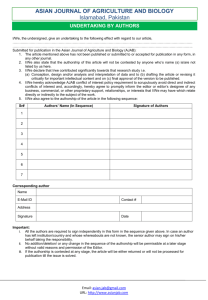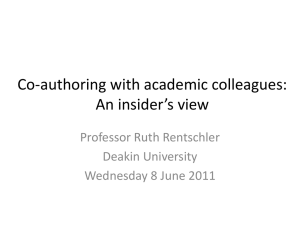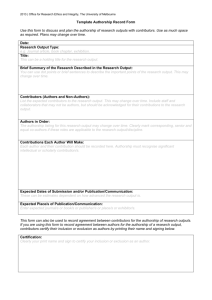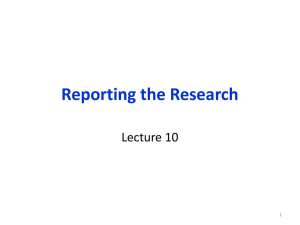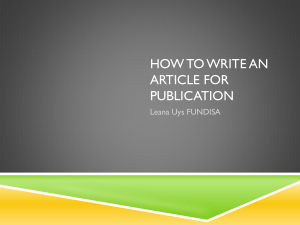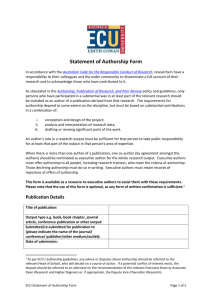Authorship practices policy
advertisement
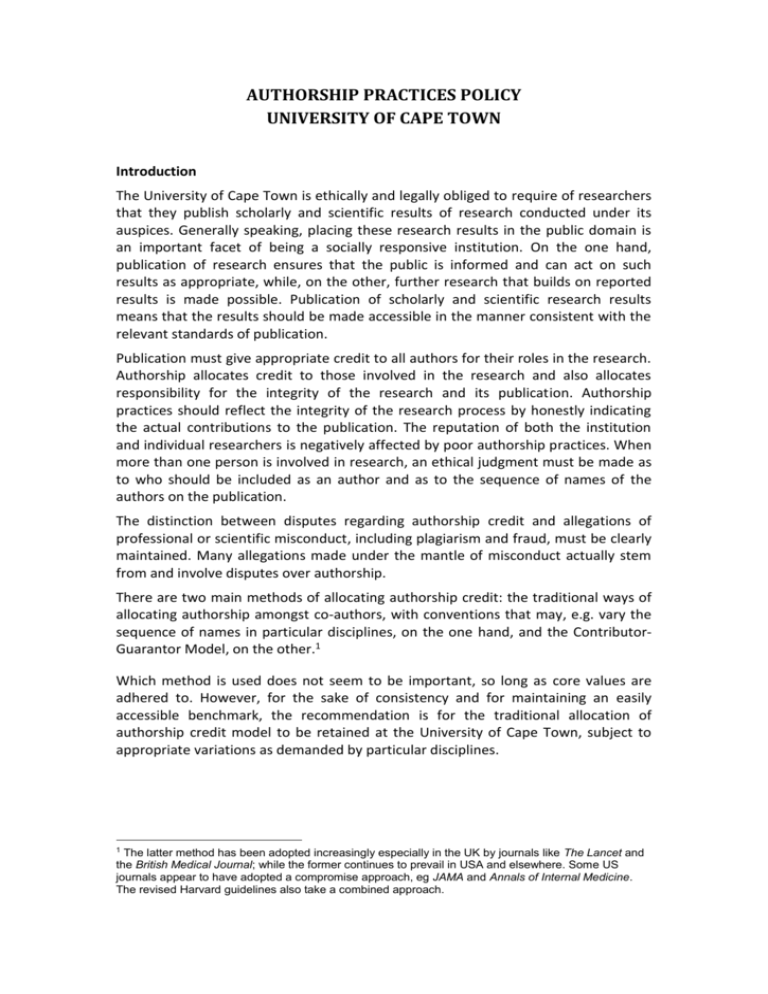
AUTHORSHIP PRACTICES POLICY UNIVERSITY OF CAPE TOWN Introduction The University of Cape Town is ethically and legally obliged to require of researchers that they publish scholarly and scientific results of research conducted under its auspices. Generally speaking, placing these research results in the public domain is an important facet of being a socially responsive institution. On the one hand, publication of research ensures that the public is informed and can act on such results as appropriate, while, on the other, further research that builds on reported results is made possible. Publication of scholarly and scientific research results means that the results should be made accessible in the manner consistent with the relevant standards of publication. Publication must give appropriate credit to all authors for their roles in the research. Authorship allocates credit to those involved in the research and also allocates responsibility for the integrity of the research and its publication. Authorship practices should reflect the integrity of the research process by honestly indicating the actual contributions to the publication. The reputation of both the institution and individual researchers is negatively affected by poor authorship practices. When more than one person is involved in research, an ethical judgment must be made as to who should be included as an author and as to the sequence of names of the authors on the publication. The distinction between disputes regarding authorship credit and allegations of professional or scientific misconduct, including plagiarism and fraud, must be clearly maintained. Many allegations made under the mantle of misconduct actually stem from and involve disputes over authorship. There are two main methods of allocating authorship credit: the traditional ways of allocating authorship amongst co-authors, with conventions that may, e.g. vary the sequence of names in particular disciplines, on the one hand, and the ContributorGuarantor Model, on the other.1 Which method is used does not seem to be important, so long as core values are adhered to. However, for the sake of consistency and for maintaining an easily accessible benchmark, the recommendation is for the traditional allocation of authorship credit model to be retained at the University of Cape Town, subject to appropriate variations as demanded by particular disciplines. 1 The latter method has been adopted increasingly especially in the UK by journals like The Lancet and the British Medical Journal; while the former continues to prevail in USA and elsewhere. Some US journals appear to have adopted a compromise approach, eg JAMA and Annals of Internal Medicine. The revised Harvard guidelines also take a combined approach. UCT Authorship Policy – PC 1/2011 – last updated November 2010 2 Core value The governing ethical value underpinning this guideline is justice, made manifest by processes that foster the principles of fairness, transparency and reasonableness. Responsibilities and expectations This guideline seeks to offer broad guidance on authorship matters across the university. It is accepted that the guideline can provide only general indications of expected standards of professional conduct rather than rigid rules. Nevertheless, the guideline is prescriptive to the extent that It requires researchers, especially principal investigators and research team leaders, to set a positive example by their actions and behaviour; It requires researchers to comply with the principles of fairness, transparency and reasonableness; and to be sensitive to social, cultural and ethical issues that have a bearing on their research; It requires researchers to strive for the highest levels of integrity and professionalism; It requires researchers to take responsibility and act in accordance with that responsibility when conducting or supervising research, including deliberating on matters concerning authorship; It requires researchers, including trainees, to familiarize themselves with the principles that govern good research conduct including those that pertain to authorship; It requires the senior researcher(s) involved with a research project to take responsibility for anticipating possible disagreements concerning authorship credit and to initiate conversations on the matter before students and other participants are permitted to invest substantial time on the project; It places a special obligation on senior staff members to avoid co-authorship on papers generated from independent work by their junior colleagues or students; co-authorship should be allocated only accordance with the eligibility principles for authorship; It requires the allocation of responsibilities amongst researchers to be commensurate with their skill and training. Principles for judging eligibility for authorship Each person who makes a meaningful contribution to the research project should be credited appropriately. An author is someone who makes a significant or substantial contribution to the production of the publication. The precise meaning of ‘significant or substantial contribution’ may be discipline-specific but is commonly understood as requiring that 1) each author should have participated in formulating the research problem, or analysing and interpreting the data or have made other PC 01/2011 2 Authorship practices policy UCT Authorship Policy – PC 1/2011 – last updated November 2010 3 substantial scholarly effort or a combination of these; and/or 2) have participated in writing the paper; and 3) should have approved the final version for publication and be prepared to defend the publication against criticisms. The weight accorded to each of these components may vary according to the scholarly discipline or scientific field. Various conventions and customs exist and may be discipline-specific. A co-author does not have to be a current member of staff or student in order to retain allocation of or to be allocated authorship credit. Co-authors must be informed of and understand the conventions regarding sequence of names and agree in advance, ie as early as possible in the research process, to the assignment of names in the sequence. In the case of interdisciplinary and inter-institutional research, the senior researcher(s) have a special responsibility to ensure that discussions about authorship matters and possible differences in conventions are initiated early and with all researchers that are involved. None of rank, position, patronage, technical assistance, provision of research materials or facilities by itself is a criterion for authorship. Gift authorship, honorary or courtesy authorship is also unacceptable for being inconsistent with the governing values and principles of the guideline. Provision of funding alone for a research group is not a criterion for authorship. Any person who does not meet the eligibility criteria but who has made other substantial contributions should be acknowledged in the publication. The manner of acknowledgement should occur according to the publication standards of the particular discipline. Dispute resolution mechanisms Each faculty, department, division, unit or research team (as the case may be) must have a dispute resolution mechanism, described in writing and made easily accessible to all researchers. The dispute resolution mechanism must provide for a graduated method of dealing with disputes about authorship; i.e. the first level should be that coauthors are expected to sort the dispute out amongst themselves. Failing resolution at this level, the matter must be referred upwards to the head of the research team, unit, division, department, or faculty (as the case may be) or to the Faculty Research Committee who should use the criteria as outlined in this guideline to attempt to resolve the dispute. Where a disputant is such a head, the matter must be referred upwards. Failing resolution at this level, the matter must be referred upwards to the University Research Committee who likewise should use the criteria as outlined in this guideline to resolve the dispute. Thereafter, if the matter remains unresolved, the University Research Committee must have the power to refer the matter to arbitration. The PC 01/2011 3 Authorship practices policy UCT Authorship Policy – PC 1/2011 – last updated November 2010 4 composition of the arbitration board is to be decided by the University Research Committee in consultation with the Senior Executive Committee of the University. The finding of the arbitration board is final. Any member of the arbitration board involved in attempted resolution of the dispute prior to consideration by the arbitration board will recuse him or herself. In addition, each faculty, department, division, unit (as the case may be) must have a complaints process, described in writing and made easily accessible, especially to student and junior staff researchers. The complaints process should be used when a student or junior staff member thinks s/he has been unfairly treated insofar as allocation of authorship credit is concerned. The complaints process should include protection in the form of utmost confidentiality for the student or junior staff member who lodges a complaint. The complaints process should include recourse to someone other than the supervisor of the student, in the event that the complaint concerns conduct of the supervisor. Practical and procedural considerations Clear and careful planning and communication are central to the ethical research process, including the allocation of authorship credit and responsibility. Most misunderstandings and resultant recriminations can be avoided if clear and fair communication occurs as part of the early stages of the collaborative research process. It is expected thus that the appropriate practice is to deal with issues of authorship at the earliest practical stage of a research project. This kind of practice allows for early clarification of roles and minimising of (possible) disappointments amongst participants. Discussion of authorship credit and responsibility should include questions like: Who will be named as an author or contributor if the research results are submitted for publication or presentation? What sequence of names is envisaged? The decision should be made by the co-authors; if disagreement persists, the senior or lead author must decide. What are responsibilities and expectations for each contributor? Are there intellectual property (IP) or confidentiality matters that may affect publication? When is the next meeting to discuss authorship matters? It is prudent to anticipate that personal circumstances may change eg birth, death, divorce, which may necessitate appropriate changes to authorship arrangements. It should be noted that the question of determining authorship of a publication is completely separate from that of determining inventorship of an invention described or discussed in the publication. A person named as an author in a publication will not necessarily be an inventor for purposes of determining inventorship. Conversely and inventor will not necessarily be an author on a paper describing the invention. PC 01/2011 4 Authorship practices policy UCT Authorship Policy – PC 1/2011 – last updated November 2010 5 One author must be designated as corresponding, senior or lead author. This role carries the responsibility of vouching for the integrity of the research process and the publication of the research as a whole. The role includes the responsibility for ensuring that all co-authors who meet the eligibility criteria are included and agree to be included; for communicating with the publisher and the other co-authors about the progress of review and publication; about any changes in co-authorship; about ensuring that all listed authors have approved the submitted version of the manuscript. It is recommended that a written record of the authorship credit discussion and agreement be maintained. Discipline-specific conventions, professional association and research journal conventions regarding variations to the usual conventions must be dealt with as early as practicable in the research process. At no time, however, should the conventions be permitted to override the core value of justice. It is recommended that each faculty, department, division, unit or research team (as the case may be) draws up a set of processes, especially in relation to collaborative staff/student publications, that will clarify expectations concerning authorship for each student and staff member. The duality of the supervisor/researcher role for staff members should be explicitly dealt with. For example, on the one hand, the staff member is obliged to assist the student to grow academically which would entail encouragement, mentoring and even possible co-authorship; on the other, the staff member has an obligation to present the student honestly and fairly to the research community, which means that a student’s skills and abilities must not be misrepresented. It is strongly recommended that each faculty, department, division, unit or research group (as the case may be) facilitates regular discussion of hypothetical or real examples of difficult cases of authorship credit so that good research practice is fostered and shared understanding of difficult situations is promoted. It is strongly recommended that each faculty, department, division, unit or research team (as the case may be) undertakes regular revision of their guidelines and procedures (at minimum this should happen every three years) to keep them up to date and in line with changing practices. This document is indebted in part to authorship policies from the following institutions: British Sociological Association; Duke University; Harvard University; Michigan State University; Murdoch University, Perth Australia; Stanford University; University of Pennsylvania; University of Pittsburgh; Yale University, most of which incorporate authorship principles developed by the International Committee of Medical Journal Editors (ICMJE). Further assistance was gleaned from: Fine, Mark A and Lawrence A Kurdek ‘Reflections on Determining Authorship Credit and Authorship Order on faculty- PC 01/2011 5 Authorship practices policy UCT Authorship Policy – PC 1/2011 – last updated November 2010 6 student Collaborations’ American Psychologist (1993) 11, 1141-1147. Gawrylewski, Andrea ‘Bringing Order to Authorship: How to resolve authorship disputes – and avoid them altogether’ The Scientist Vol 21, 91. Jones, Anne Hudson ‘Can Authorship Policies Help Prevent Scientific Misconduct? What Role for Scientific Societies?’ Science and Engineering Ethics (2003) 9, 243-256. Murray, Bridget ‘The Authorship dilemma: who gets credit for what?’ APA Online (1998) 29 number 12 http://www.apa.org/monitor/dec98/credit.html [2008/07/23]. PC 01/2011 6 Authorship practices policy
